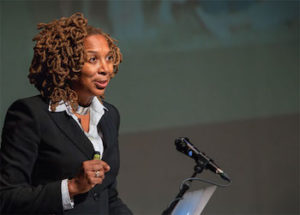
*The birth of Kimberlé Williams Crenshaw in 1959 is celebrated on this date. She is a Black educator, author, Black women's civil rights advocate and a scholar of the field known as critical race theory.
Crenshaw was born in Canton, Ohio, her parents were Marian and Walter Clarence Crenshaw, Jr. She attended Canton McKinley High School. She received a bachelor's degree in government and Africana studies from Cornell University in 1981, where she was a member of the Quill and Dagger senior honors society. She received a J.D. from Harvard Law School in 1984. In 1985, she received an LL.M. from the University of Wisconsin Law School, where she was a William H. Hastie Fellow, and law clerk to Wisconsin Supreme Court Judge Shirley Abrahamson. In 1986, Crenshaw joined the faculty of the University of California, Los Angeles School of Law.
In 1989, she founded of the field of critical race theory, and coined the phrase Intersectionality. In 1991, Crenshaw assisted the legal team representing Anita Hill at the U.S. Senate confirmation hearings for Supreme Court Justice Clarence Thomas. Crenshaw is the co-founder and executive director of the African American Policy Forum (AAPF), a think tank focused on "dismantling structural inequality" and "advancing and expanding racial justice, gender equality, and the indivisibility of all human rights, both in the U.S. and internationally." In 1995, Crenshaw was appointed as full professor at Columbia Law School. In 1996, she co-founded and is the executive director of the nonprofit think tank and information clearinghouse, The African American Policy Forum, which focuses on issues of gender and diversity. Its mission is to build bridges between scholarly research and public discourse in addressing inequality and discrimination. Crenshaw has been awarded the Fulbright Chair for Latin America in Brazil, and in 2008, she was awarded an in-residence fellowship at the Center of Advanced Behavioral Studies at Stanford.
In 2001, she wrote the background paper on Race and Gender Discrimination for the United Nations World Conference on Racism, helped to facilitate the addition of gender in the WCAR Conference Declaration, served as a member of the National Science Foundation's Committee to Research Violence Against Women and the National Research Council panel on Research on Violence Against Women. Crenshaw is a member of the Domestic Strategy Group at the Aspen Institute, the Women's Media Initiative. Crenshaw's work has been cited as influential in the drafting of the equality clause in the Constitution of South Africa She contributed the piece "Traffic at the Crossroads: Multiple Oppressions" to the 2003 anthology Sisterhood Is Forever: The Women's Anthology for a New Millennium. In 2016, Crenshaw delivered a keynote speech at the Women of the World festival at the Southbank Centre in London, England. She spoke on the unique challenges facing women of color when it comes to the struggle for gender equality, racial justice and well-being. A key challenge is police brutality against black women, she highlighted the #SayHerName campaign which is aimed at uplifting the stories of black women killed by the police. Her latest book, On Intersectionality: Essential Writings of Kimberlé Crenshaw is expected in 2019. This book provides essays and articles that help define the concept of intersectionality.